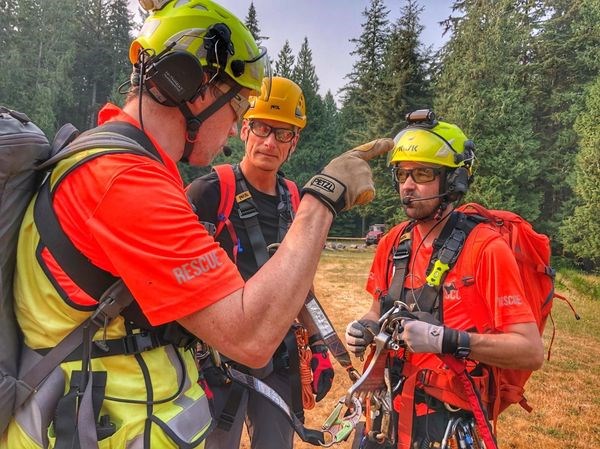North Shore Rescue crews were kept busy with back-to-back calls in the backcountry starting at about 3 p.m. on Sunday (Aug. 1).
Two of the calls were for injured hikers. One was for an injured dog.
The first call was relatively straightforward – a woman in her 50s who was hiking near Kennedy Falls on Mount Fromme fell and injured her hip. Rescue crews were able to get in quickly with a Talon helicopter and long-line the hiker out to the Bone Creek station, said search manager Paul Markey.
But events quickly turned serious when the team received an emergency SOS signal that had been triggered off a satellite beacon.
In this case, the team had no other information except GPS co-ordinates of where the SOS had been triggered, said Markey – a location just south of Lynn Lake.
But when a rescue team was dropped off by helicopter, “there was nobody there,” he said.
Eventually, hiking south along the trail, they eventually caught up to two men who had triggered the SOS after their 100-pound dog became injured and they had to carry it.
“They should have stayed in the same location,” said Markey. “Otherwise we’re chasing a moving target.”
Markey added usually an SOS should also be reserved for cases where people – rather than animals – are injured or in serious trouble, because the alerts result in resources being diverted from other calls.
The third call of the weekend was by far the most complicated.
A couple in their 40s from Vancouver had set off on Saturday for an overnight backpacking trip to Elsay Lake on Mount Seymour. As they approached the lake around 8 p.m., one person – the man – decided to go on ahead and set up camp. Shortly after he did so, however, the woman rolled her ankle on the trail and became lost in fading light.
“She ended up following a creek that leads down to Indian Arm,” said Markey. When it became completely dark, the woman stopped for the night.
Her partner, meanwhile, came back to look for her but couldn’t find the woman and returned to camp. With no cell service and no satellite device, neither of the hikers had a way of contacting each other or rescue teams. Around 5 a.m. the man came back along the trail and blew his whistle. The woman apparently heard the whistle and shouted a response but her partner didn’t hear her. The man then packed up the camp and headed back down the trail to go and raise the alarm.
The woman, meanwhile, decided to head downhill, “which is never a good idea on the North Shore if you’re lost,” said Markey. Fortunately, she came across a North Shore Rescue “escape trail” leading down to Indian Arm. When she got close to the Coldwell Beach area, she was able to get cell service to communicate with rescuers.
Using a fluorescent tarp, the woman was able to signal her location, which was quickly spotted from the air, said Markey.
A doctor was flown in to attend to her injured ankle and the woman was long-lined out.
The reunion between the couple was somewhat frosty, he added.
“She was not very happy.”
Markey said one of the key takeaways is “never separate” in the backcountry. “If they had stayed together they would never have had this issue.”
Fortunately the hikers were prepared with good supplies, but were missing a key item – a satellite device for emergency communication.
North Shore Rescue crews also flew to Vancouver Island on Saturday to assist with a long-line rescue of a hiker with back injuries who fell in Myra Falls in Strathcona Park.
Markey warned with most helicopters busy fighting wildfires, there are fewer resources available for anyone who gets injured in the backcountry currently.



